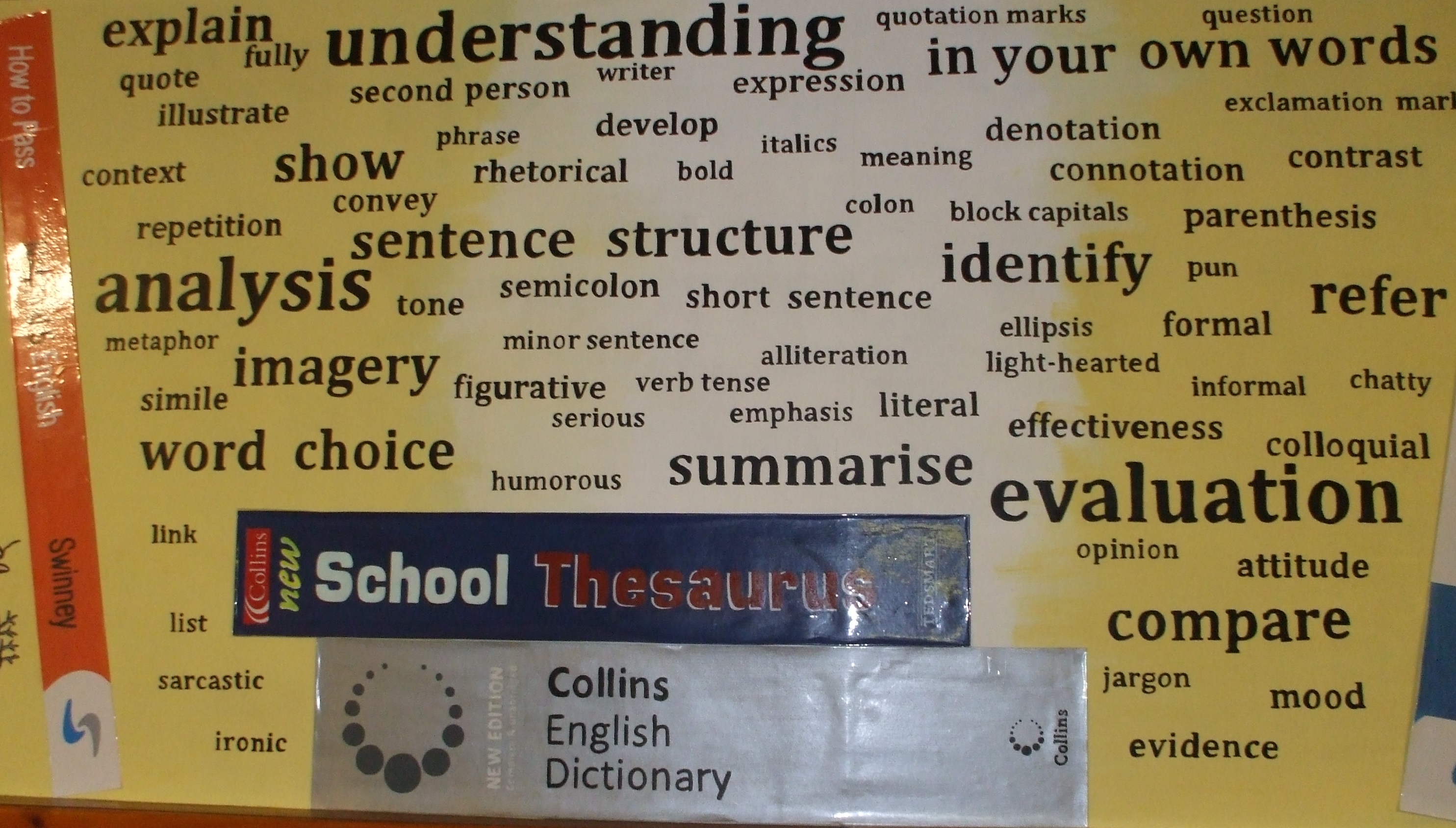Click on this link for information on how to tackle the Standard Grade Reading papers. Standard Grade Reading
Standard Grade Reading Checklist
The following information is available in booklet form from your English teacher.
STANDARD GRADE ENGLISH
As in S1 and S2, your English course will aim to help you develop your skills in Reading, Writing, Talking and Listening.
There are three elements that make up your overall grade in English. Each element accounts for one thirdof your overall grade.
The three elements are:
1) The Exam
2) The Folio
3) Talk
1) The Standard Grade Exam in English
You will normally sit this examination at the end of your 4th year (unless you are in the fast-track class in which case you do the Standard Grade course in one year). The exam comprises a Reading Test and a Writing Test and is worth one third of your overall grade.
The Reading Test is divided into three levels – Credit, General and Foundation. The majority of candidates sit the General paper and one other. Whether you sit the Credit or the Foundation paper will be decided by you and your teacher near to exam time. Each paper consists of a passage and questions on the passage – an interpretation or close reading. You have 50 minutes to complete each paper.
The Writing Test is the same for everyone. You simply have to write one essay from a choice of essay titles in 1 hour and 15 minutes. (There is no upper word limit but the lower limit is 100 words.)
2) The Folio – Reading

Throughout S3 and S4 you will be writing about the novels, short stories, poems, plays etc. (literary texts) that you study in class. The essays that you write are called Critical Evaluations. In these essays you need to show that you know about, understand, and have an opinion on the texts you have been reading. Your teacher will, of course, be there to help you plan and redraft your essays. You may also be given the chance to write imaginatively about the text. This type of essay is called an Imaginative Response.
These essays will show your ability in Reading and three essays of this type will be included in your folio. These three essays will consist of:
two critical evaluations of literary texts, each of a different form/genre i.e. poetry, drama or prose (fiction or non-fiction)
and one further critical evaluation of a literary text , from any genre
or one critical evaluation of a media text (film, radio or television programme)
or one imaginative response to a literary text or texts.
The Folio – Writing

You will be writing essays throughout S3 and S4, both in class and as homework. You may be asked to write stories, scripts, poems etc based on made-up or true experiences or inspired by the literary texts you have been studying. You will also be required to write essays which give information or in which you discuss opinions and ideas on a topic. These essays will show your ability in Writing.
Two writing essays will be included in your folio: one will be factual, informative or discursive; the other will be personal or imaginative.
Together with the three Reading essays this means that your folio will contain five essays in total. The folio accounts for another third of your overall grade for English.
3) Talk

Throughout S3 and S4 you will be expected to give short Individual Talks, usually to your classmates, either to the whole class or in smaller groups. You will also take part in Group Discussions, which, of course, involves listening to others. Group discussions may take place on a formal or an informal basis as part of ongoing work in the classroom.
Your teacher will give you a grade for Talk which is sent to the Scottish Qualifications Authority at the same time as your folio. This grade also forms one third of your final award.

It is, therefore, important that you take Talk seriously as it can make a big difference to your final result.
How Your Work Will Be Marked
Your teacher will grade your work from 1 to 6. For each Talk assessment and for final drafts of Reading or Writing pieces you will be given a grade from 1 to 6. When you do a Close Reading Test (an Interpretation) the total score (e.g. 29/48) will be converted into a grade.
1 and 2 are CREDIT grades.
3 and 4 are GENERAL grades.
5 and 6 are FOUNDATION grades.
The Differences Between Grades
Writing
In a Credit 1essay the following points will all be excellent:
- Vocabulary (your choice of words)
- Paragraphing and sentence structure
- Use of language (how well you express what you want to say).
- Ideas and imagination
- Relevance (how closely you follow what you were asked to do).
- Development (length – the upper limit is 800 words).
A Credit 1 essay will be stylish, detailed, sensitive and skilful.
A Credit 2 essay will contain some but not all of these excellent qualities.
A General 3essay:
- Can be read and understood easily and clearly
- Is reasonably well structured in that ideas are presented in sequence
- Contains a reasonable number of good ideas
- Is generally accurate with only a few sentencing and/or paragraphing errors.
A General 4essay has some of these qualities but will include:
- Errors in sentencing
- Poor paragraphing
- Too few relevant ideas.
A Foundation 5essay:
- Can be understood fairly easily.
- Contains a large number of mistakes which mean parts of it have to be read again.
A Foundation 6 essay:
- Can still be understood in parts.
- Is at least 100 words in length.
- Has many weaknesses in most areas.
- Contains ideas which are not clearly understood on first reading.
You will have the opportunity to redraft essays written in class. This means producing another copy of your essay after your teacher has read it and told you how it might be improved. Your teacher will also highlight any mistakes you have made but it is up to you to check where you have gone wrong and to make the necessary changes. It is well worth taking the time to produce the very best work that you can.
The Differences Between Grades
Folio – Reading
When you are writing a Critical Evaluation of a text or texts for your folio, it is useful to know what it is that the marker is looking for at each grade.
It is your response to the text and your knowledge of it which are of more importance to the marker than accurate sentencing and spelling etc. However, your work must still make sense and too many sentencing and spelling errors etc. may make it difficult to understand what it is you are trying to say.
Your work will be graded according to how well your work demonstrates your knowledge, understanding and personal response to the text(s) you have studied.
Foundation
- You have some idea of what the text is about.
- You have been able to pick out some of the more important details.
- You were able to give examples to show your understanding.
- You have been able to write about how you really felt about something in the text. You show a clear personal reaction to the text.
- You have described one or two examples of the writer’s skill and quoted from the text or referred to a particular part of it.
- Your work is at least 100 words long and is what you were asked to do.
A Grade 5 essay will demonstrate most of these points.
A Grade 6 essay will demonstrate a few of these points.
General
- You know what the text is about.
- You have been able to pick out the more important points or ideas and give examples to show your understanding of the whole text.
- You have been able to write in some detail about how you really felt about more than one part of the text. You have backed this up by picking out suitable evidence from the text.
- You have identified particular features of the writer’s skill. You have explained how they work and what they are called (e.g. you correctly identify simile and/or metaphor etc.). You have quoted or given examples and commented on them and their effectiveness briefly.
- You have organised your writing in order to try to complete the task you were set.
- Most of what you have written is relevant.
- Your essay is a reasonable length, probably between 300 and 600 words.
A Grade 3 essay will demonstrate your ability to do all of the above.
A Grade 4 essay will demonstrate some of the above.
You will not be given a Grade 3 or above if you simply re-tell the story. It is important to show that the text had an impact on you and that you have some appreciation of the way it is written.
Credit
-
You know the text very well.
-
You have closely examined the more important points and ideas and have selected the most suitable details. You are able to give good examples to show that you have understood the whole text.
-
You have been able to write in a detailed and clear way about what you have really enjoyed in or gained from the text. You have been able to back this up with well-chosen evidence from the text.
-
You have shown, by close examination, an understanding of the writer’s skill. You have used the correct critical terms where appropriate and have quoted or given examples and commented on them clearly and fully.
-
You have organised your essay in such a way as to complete successfully the task you were set.
-
You have selected what is relevant from the text and highlighted what is important.
-
You have written at length. This will normally mean about 800 words.
To obtain a Grade 1 you must demonstrate all of the above.
To obtain a Grade 2 you must demonstrate most of the above.
Folio – Imaginative response
In grading this kind of essay, the marker will take account of the following:
- How well you know the details of the text.
- How well you handle the type of writing you are doing e.g. short story, diary, newspaper article etc. (This includes your use of appropriate vocabulary, structure, punctuation etc.).
- How well you have organised your work.
The Solo/Individual Talk
In order to grade your talk the teacher will look at the following:
- How complex and logical your ideas are.
- How well you do what you were asked to do.
- The vocabulary (the words) you choose.
- How well you suit what you have to say to the audience you are speaking to.
- How clear you are.
- Whether you make good eye contact all the time with your audience.
Confidence comes with practice but you will also find that that you will be more confident and relaxed if you have prepared your speech well.
Group Discussion
In order to grade your contribution to a group or class discussion, your teacher will be looking for the following:
- How much you have to say. (It is not always the person who says the most that gets the best grade, however, as it is important to listen to and acknowledge the contributions of others in the group.)
- How good your ideas are and whether they are relevant.
- Whether you can use evidence to back up your opinions.
- How carefully you listen to what others have to say and how you respond to this.
- How clear you are.
In group discussion it is important to listen to the contributions of others and not to dominate the conversation. It is also important to keep to the topic set.









November 8, 2009 at 10:28 pm
Hello,
My name is Tina Stevens and I am an English teacher at Notre Dame High and also a member of the National Glow team. One of my roles in the Glow Team is to facilitate and maintain the English teachers national Glow group. Your blog is fantastic and I was wondering if you would mind if I posted a link to it in the group for other English teachers to see it. If you are not sure about Glow then info can be found at http://www.ltscotland.org.uk/glowscotland/index.asp
Congratulations again on a fantastic blog site.
November 10, 2009 at 12:54 am
Thank you for your positive comments. Please feel free to post a link to the blog. I would welcome comments and suggestions from other English teachers as we are not yet connected to Glow.
November 15, 2009 at 10:16 pm
Thank you so much I think other English teachers would be really interested in the work that you are doing. Good luck with Glow when it arrives!
January 26, 2012 at 4:32 pm
hello, I i got a 1 and a 2 in group discussions (had 2 group discussions) and a 1 and a 2 for solo talks (1 in one talk and a 2 in the other), will me overall speaking garde be a 1 or a 2?
January 26, 2012 at 7:34 pm
You should ask your teacher this question as the answer may depend on a number of factors. It sounds as if you may have met the standards required to achieve a 1 for your overall talk grade.
April 27, 2012 at 1:42 pm
Does your folio and the exam you do on the day get marked by same person?
April 27, 2012 at 2:58 pm
No. Different markers mark different papers. The Reading and Writing papers are marked separately – as are the folios.
April 27, 2012 at 4:04 pm
Thank You, So i wrote the same story that was in my folio on the day of the exam, and they will never meet? I was told this was okay
April 29, 2012 at 12:23 pm
Yes, this is perfectly okay.
April 21, 2013 at 5:15 pm
if I get a 1 in my folio for writing and a 2 in my exam for writing, do I get an overall 1 or 2? Some people have been saying that there is more weight on the exam but I’m unsure
April 24, 2013 at 9:19 am
I asked a member of my department who marks the Writing paper this question and he did not know the answer. I know from my own folio marking experience that if you get a 1 for one of your writing essays in the folio and a 2 for the other, your overall grade is a 2. It may well be the same when it comes to the folio and your Writing exam – but we do not know. If you got a 1 for your Prelim essay, then you may be able to appeal for the Writing element to be upgraded if you get a 2 in the exam. The best solution, of course, is to choose a task in the Writing paper that allows you to best show off your writing ability.
Good luck for all your exams.